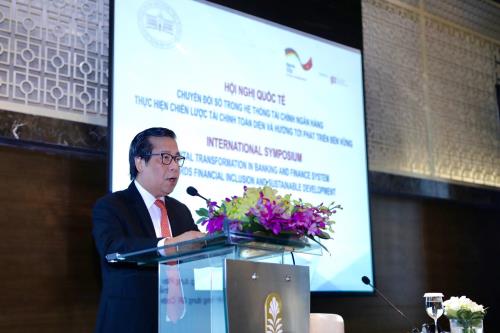_med.jpg) Economy
Economy


|
| Deputy Governor of the State Bank of Vietnam Nguyễn Kim Anh speaks at a workshop discussing the digital transformation of Viêt Nam's banking and finance sector in Hà Nội. — VNA/VNS Photo |
HÀ NỘI —- Việt Nam's banks and financial institutes must be ready for a digital transformation, said policymakers and experts at a workshop yesterday in Hà Nội.
Digital technologies have had a strong impact on the country's economy and nowhere that impact has been more strongly felt like in the banking and finance sector. Technologies helped improve business models and processes as well as created new products and services to serve the need of customers.
Take mobile payments, for example. According to a PwC survey this year, Việt Nam was among the countries with the fastest growth rate in mobile payments. The number of users had seen a sharp increase to 61 per cent from just 37 per cent the year before.
In the first eight months of 2019, total value of mobile payments in Việt Nam increased by 150 per cent as the number of mobile transactions doubled from the same period last year, according to a report by the State Bank of Vietnam (SBV).
A report by Google in April showed the size of Việt Nam's digital economy could reach US$12 billion by the end of 2019 and $43 billion by 2025. Việt Nam and Indonesia are the fastest-growing digital economies in ASEAN, with over 40 per cent annual growth.
The SBV projected the digital economy would account for up to 20 per cent of the country's GDP in 2025. Technologies, especially digital technologies, would be an important driver for economic growth and increased productivity to help develop the nation.
"The digital transformation is inevitable and Việt Nam's banking and finance sector is well-prepared to embrace it," said Nguyễn Kim Anh, the SBV's Deputy Governor, at the workshop.
Anh said the sector was among the country's leaders in adopting new technologies and innovations, and in reworking its regulatory and legal framework to make use of their advantages.
Dr Sebastian Paust, First Counsellor, Head of Development Cooperation at the German Embassy in Hà Nội, discussed Germany’s development cooperation strategy in supporting digital transformation. He said Germany would continue its support for the Vietnamese banking and finance system for the implementation of digital transformation programmes.
“Digitalisation in the context of Industry 4.0 and rapid changes in technologies has great potential to help achieve the objectives of green economic growth and sustainable development," said Dr Michael Krakowski, Director and Chief Technical Advisor of the Macroeconomic Reforms/ Green Growth Programme.
The workshop was a part of the Macroeconomic Reforms/Green Growth Programme implemented by GIZ Vietnam, and was co-organised by SBV and GIZ Viet Nam, which operate on behalf of the German Federal Ministry of Economic Cooperation and Development (BMZ). VNS

_med.jpg)


